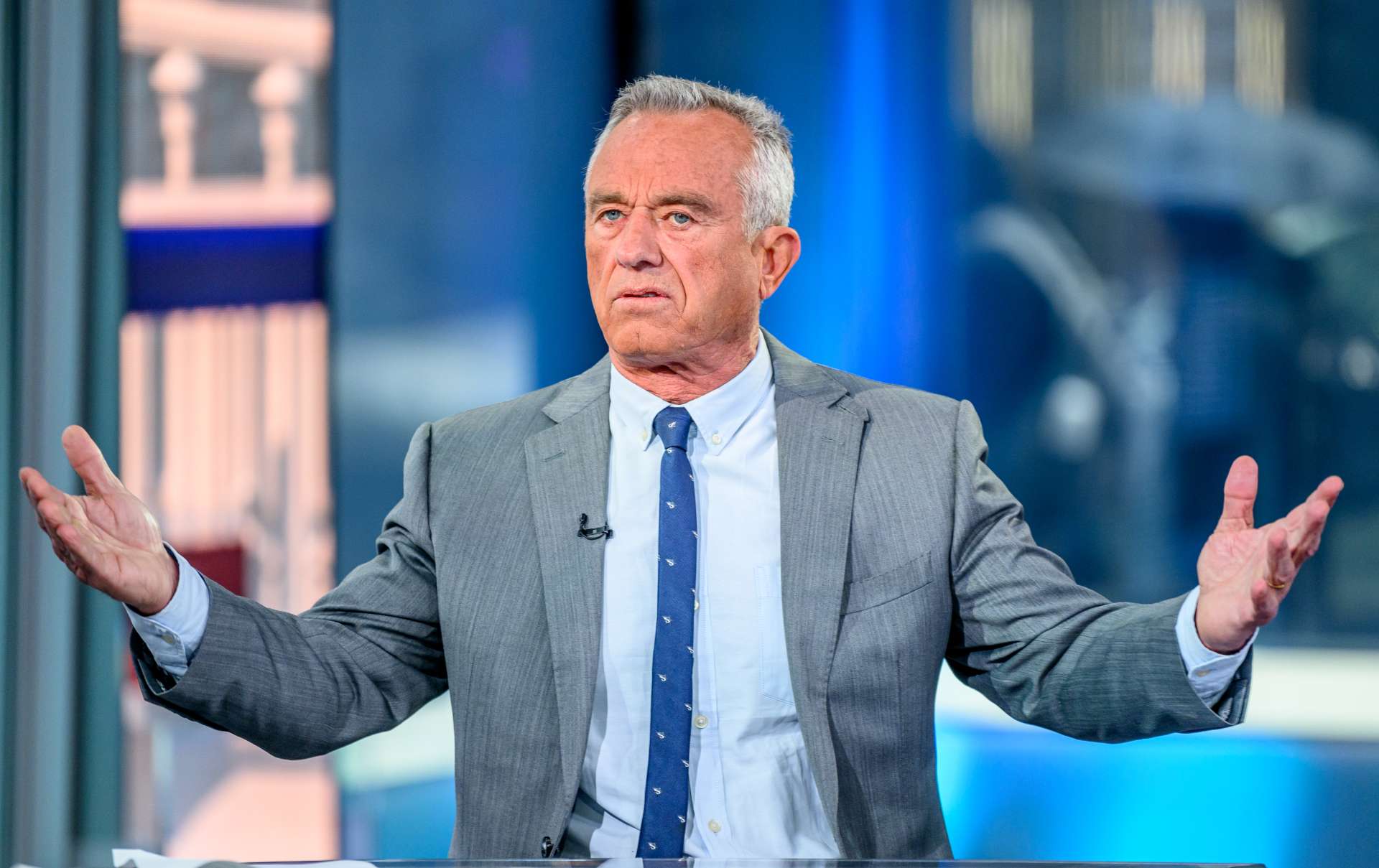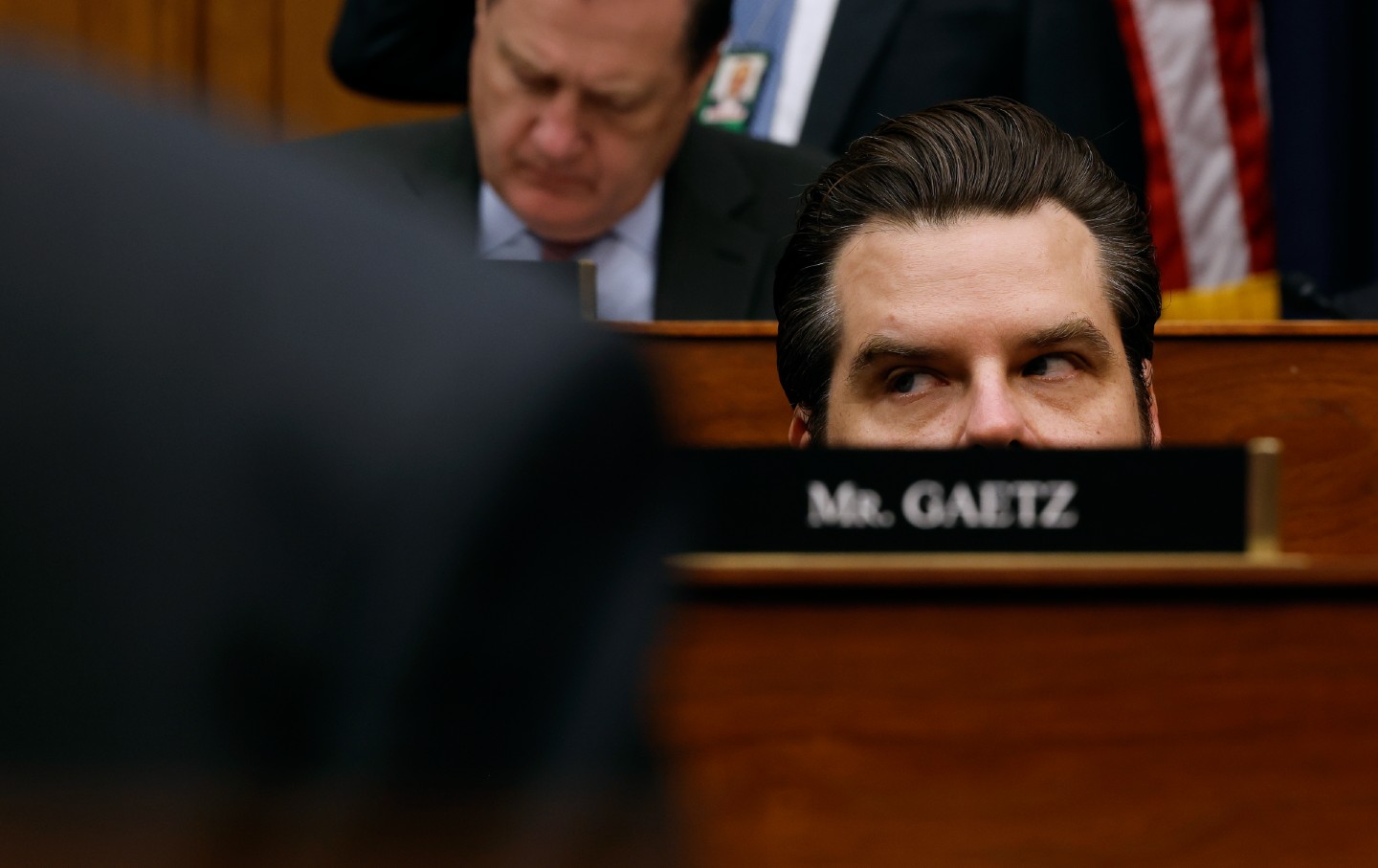How Robert F. Kennedy Jr.’s Brain Became the Diet of Worms
Can a presidential candidate afford to lose gray matter to parasites?

Until recently, the title of politician who generates the most mortifying headlines was indisputably held by South Dakota Kristi Noem, who in recent weeks has given us such marvels as “Trump VP contender Krist Noem writes of killing dog,” “Kristi Noem suggests Biden’s dog Commander should be killed too,” and “Kristi Noem has admitted the Kim Jong Un part of her book isn’t true but she read it for her audiobook anyway.”
You might think it’s impossible to top news stories about killing a dog and lying about meeting a dictator. But insurgent candidate Robert F. Kennedy Jr. inspired a headline on Wednesday that was even more disquieting: “R.F.K. Jr. Says Doctors Found a Dead Worm in His Brain.” Almost equally troubling was the subhead in The New York Times: “Presidential candidate has faced previously undisclosed health issues, including a parasite that he said ate part of his brain.”
Apparently, in 2010 Kennedy was experiencing symptoms of cognitive decline. His memory was becoming hazy and he was walking around in a state of confusion. Brain scans revealed a mysterious patch—possibly a tumor. At first, doctors feared that he, like his uncle Edward Kennedy, was suffering from brain cancer. But then a doctor at New York Presbyterian offered another diagnosis, that the blotch on the scans was, in Kennedy’s words, “caused by a worm that got into my brain and ate a portion of it and then died.”
Kennedy said these words as part of a deposition made in 2012 during divorce proceedings with his second wife, Mary Richardson Kennedy. In that deposition, Kennedy gave great salience to his poor health and diminished cognitive capacity, which he claimed resulted in a lower income—hence justification for a smaller alimony payment.
Aside from the dead parasite nestled inside his brain, Kennedy claimed that as a result of mercury poisoning (which he blamed on his love of eating fish), “I have cognitive problems, clearly. I have short-term memory loss, and I have longer-term memory loss that affects me.” The presidential hopeful ruefully acknowledged, “I loved tuna fish sandwiches. I ate them all the time.” To find someone else as in love with tuna as Kennedy, you have to turn to a movie: In the 2002 black comedy Matchstick Men, the addled and creepy Roy Waller (played by Nicholas Cage) is a tuna junkie on par with Kennedy.
Since college, Kennedy has also struggled with atrial fibrillation—an irregular heartbeat—which has led to repeated hospitalization. In a striking metaphor, he says of this condition, “It feels like there’s a bag of worms in my chest.”
Kennedy’s litany of health problems casts a shadow on his presidential aspirations for two distinct reasons. First, as the Times notes, Kennedy has made his personal fitness a key argument, contending that as a vigorous 70-year-old he is superior to his rivals Joe Biden (age 81) and Donald Trump (age 77), both of whom have arguably given signs of physical and cognitive decline. Kennedy’s campaign ads and videos show him skiing and lifting weights. He’s clearly meant to be someone in the same sporting league as his father (Robert F. Kennedy Sr.) and uncle John F. Kennedy, both of whom were famous for their fiercely competitive game of touch football. But of course the Kennedy legend always benefited from more than a bit of media trickery: Posthumously, it was revealed that John suffered from a longtime back injury that led to a heavy reliance on painkillers.
Is Robert Kennedy following in his uncle’s footsteps, presenting himself as an emblem of vigor while hiding a medical history that many voters might regard as disqualifying? Kennedy’s campaign claims he has fully recovered from his ailments and compares favorably to his political rivals. That may be the case, although even Biden and Trump do not have, as far as we know, missing brain parts.
In truth, while voters do seem to like robust politicians, cognitive decline should be a far bigger cause for concern than any other physical ailment. After all, the polio-stricken Franklin Roosevelt—wheelchair bound for most of his political career—was one of America’s greatest presidents. Jesse Jackson drew great applause at the 1984 Democratic National Convention when he thundered, “I would rather have Roosevelt in a wheelchair than Reagan on a horse.”
But beyond his physical impairments, Kennedy’s bizarre fish fetish raises questions about his judgment. After all, this is a man who has made his mark as an environmental lawyer, often litigating against corporations that have poisoned rivers with mercury. How could he not know about the dangers of gulping down tuna as a staple of your diet?
Kennedy’s ridiculous seafood diet parallels another example of his poor judgment, his support for the conspiracy theory that mercury in vaccines causes autism. This theory has no basis in science, and in any case, as Scientific American noted in 2017, Kennedy’s ill-informed crusade focuses on “thimerosal, a mercury-based preservative that had been removed from all childhood vaccines except for some variations of the flu vaccine in 2001.”
The Times story about Kennedy’s health thus has the effect of reminding voters of Kennedy’s great weakness as a candidate, his propensity for anti-scientific conspiracy theories (involving not just vaccines but also covid, pesticides, and pharmaceuticals). Politifact has listed some of Kennedy’s anti-scientific claims:
* Vaccines cause autism.
* No childhood vaccines “have ever been tested in a safety study pre-licensing.”
* There is “tremendous circumstantial evidence” that psychiatric drugs cause mass shootings, and the National Institutes of Health refuses to research the link out of deference to pharmaceutical companies.
* Ivermectin and hydroxychloroquine were discredited as COVID-19 treatments so COVID-19 vaccines could be granted emergency use authorization, a win for Big Pharma.
* Exposure to the pesticide atrazine contributes to gender dysphoria in children.
* COVID-19 is “targeted to attack Caucasians and black people. The people who are most immune are Ashkenazi Jews and Chinese.
If we step back from ideological debate, there is a more humane view we can take about Kennedy’s baroque medical history: It is proof of the human frailty that unites us all, whether we be commoners, kings, or Kennedys.
This was the view that William Shakespeare promoted in Hamlet (as the literary critic Ryan Ruby reminded me). In Act 4, Scene 3 of that great play, after having killed the pontificating Polonius, a closer adviser of Hamlet’s foe, King Claudius, the morose young Danish prince reflects on how we all end up as worm meat.
When Claudius asks him where Polonius has gone, the following exchange occurs:
Popular
“swipe left below to view more authors”Swipe →KING Now, Hamlet, where’s Polonius?
HAMLET At supper.
KING At supper? Where?
HAMLET Not where he eats, but where he is eaten. A certain convocation of politic worms are e’en at him. Your worm is your only emperor for diet. We fat all creatures else to fat us, and we fat ourselves for maggots. Your fat king and your lean beggar is but variable service—two dishes but to one table. That’s the end.
KING Alas, alas!
HAMLET A man may fish with the worm that hath eat of a king, and eat of the fish that hath fed of that worm.
Hamlet’s compassionate vision of the worm, the fish, and the politician all belonging to a common ecological cycle certainly describes Robert Kennedy, who has perhaps suffered, in both a metaphorical and literal way, from a convocation of politic worms in his brain.
But any magnanimous acknowledgement of Kennedy’s place in the larger cycle of life has to be balanced by candor about the real damage he’s done as a cranky conspiracy theorist and anti-science maven. Given his crackpot ideas, Kennedy brain might not have been part of that great cycle that Shakespeare sketched out. Rather, Kennedy’s brain broke that cycle. After all, the worm that died inside Kennedy’s cranium was surely malnourished to the point of starvation.
We cannot back down
We now confront a second Trump presidency.
There’s not a moment to lose. We must harness our fears, our grief, and yes, our anger, to resist the dangerous policies Donald Trump will unleash on our country. We rededicate ourselves to our role as journalists and writers of principle and conscience.
Today, we also steel ourselves for the fight ahead. It will demand a fearless spirit, an informed mind, wise analysis, and humane resistance. We face the enactment of Project 2025, a far-right supreme court, political authoritarianism, increasing inequality and record homelessness, a looming climate crisis, and conflicts abroad. The Nation will expose and propose, nurture investigative reporting, and stand together as a community to keep hope and possibility alive. The Nation’s work will continue—as it has in good and not-so-good times—to develop alternative ideas and visions, to deepen our mission of truth-telling and deep reporting, and to further solidarity in a nation divided.
Armed with a remarkable 160 years of bold, independent journalism, our mandate today remains the same as when abolitionists first founded The Nation—to uphold the principles of democracy and freedom, serve as a beacon through the darkest days of resistance, and to envision and struggle for a brighter future.
The day is dark, the forces arrayed are tenacious, but as the late Nation editorial board member Toni Morrison wrote “No! This is precisely the time when artists go to work. There is no time for despair, no place for self-pity, no need for silence, no room for fear. We speak, we write, we do language. That is how civilizations heal.”
I urge you to stand with The Nation and donate today.
Onwards,
Katrina vanden Heuvel
Editorial Director and Publisher, The Nation
More from
Jeet Heer 

Donald Trump’s Foreign Policy Will Be Chaos First, Not America First Donald Trump’s Foreign Policy Will Be Chaos First, Not America First
His team of cronies includes establishment hawks and cranky outsiders who are more likely to deliver global anarchy than world peace.

Donald Trump Is Waging a Shock-and-Awe War Against His Own Senate Donald Trump Is Waging a Shock-and-Awe War Against His Own Senate
By nominating Matt Gaetz and other dangerous cronies, the president-elect is testing congressional servility.

Bernie Sanders Is Right: Democrats Have Abandoned the Working Class Bernie Sanders Is Right: Democrats Have Abandoned the Working Class
The party chased former Republicans and rich donors, while alienating the working-class majority.

This Time We Have to Hold the Democratic Party Elite Responsible for This Catastrophe This Time We Have to Hold the Democratic Party Elite Responsible for This Catastrophe
Trump won because the opposition party is committed to ancien régime restoration in a country that desperately wants change.

Trump’s Anti-War Charade Deserves a Challenge Trump’s Anti-War Charade Deserves a Challenge
It’s a grave mistake for Democrats to let Trump be the only voice expressing revulsion at militarism.

Donald Trump Makes American Women an Offer They Can’t Refuse Donald Trump Makes American Women an Offer They Can’t Refuse
The former president wants to turn gender relations into a protection racket.


